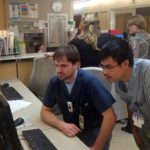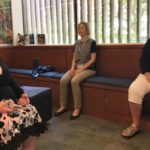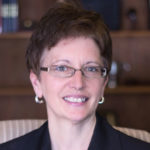
John Clark, Pharm.D., M.S., FASHP, at the Mexican Independence Day Annual Health Fair
AT THE UNIVERSITY OF SOUTH FLORIDA (USF) in Tampa, John Clark, Pharm.D., M.S., FASHP, has made a name for himself as a mentor, an active volunteer for underserved communities, and a researcher unearthing little-known facts about early African Americans in pharmacy. Although he cherishes these roles, if not for a simple twist of fate, he wouldn’t have become a pharmacist at all.
A life-changing conversation
Dr. Clark, director of experiential education and the pharmacy residency program at USF’s College of Pharmacy, was born in a farmhouse his grandfather owned in Conehatta, Miss., in an area considered part of Native American land designated for the Choctaws. He grew up about 20 miles from there in a small town called Forest, where he became interested in chemistry and applied to college as a chemistry major.
But at Texas Southern University in Houston, when he went to register for classes, Dr. Clark was surprised to overhear two young men pharmacy majors in line in front of him talking about enrolling in similar courses. He struck up a conversation with them and became so enthused about pharmacy that he crossed out chemistry on his registration forms and signed up as a pharmacy major.
About halfway through the semester, one of the deans called Dr. Clark and said he would have to switch back to chemistry, but he begged to stay. Before taking action, the dean fell ill, and Dr. Clark went on to graduate with a bachelor’s degree in pharmacy. “I have no regrets,” he says. “I love being a pharmacist.”
Preceptor and mentor
Dr. Clark is a faculty preceptor in ambulatory care for the university’s BRIDGE (Building Relationships and Initiatives Dedicated to Gaining Equality) Clinic. It is a student-run free clinic started by medical students to provide care to the underserved.

John Clark, Pharm.D., M.S., FASHP
One evening a week, Dr. Clark spends time at the clinic, helping train pharmacy students to interview patients, write chart notes, provide vaccines and medication therapy management. He also trains students to offer counseling and education about inhalers, blood glucose monitors, and smoking cessation.
In a peer-to-peer mentoring model, Dr. Clark supervises fourth-year students who watch over those earlier in their schooling. The position isn’t without its challenges in what medications to recommend. He noted that patients attending the clinic are uninsured and have little to no income. Students learn to get creative about finding free or low-cost drug programs.
“There’s a lot of fear, hand-holding, and simulations before they see patients,” said Dr. Clark. “I enjoy it because I see how they start with low confidence, but when I meet with them later, before graduation, I see the change. It so inspires me, and makes me feel clear about my role there.”
Dr. Clark also enjoys bringing student teams with him to a local Mexican Independence Day festival and a Haitian festival. They staff health fair booths screening people for diabetes, high cholesterol, and hypertension, and providing basic education and referrals to local providers for follow-up care.
Early African Americans in pharmacy
One of Dr. Clark’s passion projects over the past five years or so has been researching early African Americans in pharmacy. It started with a phone call he received from a staff member at a New York pharmacy school, looking to gain information about the first African American female pharmacy graduates for a women’s history month program.
Dr. Clark didn’t know the answer but started surfing the internet as they talked, finding a few names that could have been likely. One was Anna Louise James, the first African American female pharmacist in Connecticut, who graduated from the Brooklyn College of Pharmacy in 1908.
But he had a strong feeling there were others. He then found a book on early African American medical schools, which mentioned that some of these now-defunct schools encompassed pharmacy schools. He figured that was where at least some of the women would have gone to school.
First female pharmacy grads
From there, a spark was lit. Dr. Clark called the Library of Congress and National Library of Medicine looking for records from these early schools but came up empty. Librarians knew the schools had existed but had no records. He kept digging and visited Meharry Medical College in Nashville to study years’ worth of catalogs from its former Pharmaceutical College, which opened in 1889. Painstakingly he compiled lists of its curricula, faculty members, number of students enrolled, and number of graduates. He also called historical societies in Tennessee.
At last, he found three women he believes to be the first African American graduates of pharmacy schools, all from the same class at Meharry in 1894: Ella Coleman, Margaret Miller, and Matilda Lloyd.
The business climate likely was not easy for these women, Dr. Clark said. At the time, the few female pharmacists in business got their starts working for pharmacies owned by their fathers or brothers, and still faced some discrimination because of their gender.
African American female pharmacists would have had to get their start by affiliating with early African American physicians, he said, as they generally would not have had family members owning pharmacies.
Among Dr. Clark’s research finds is a photo of the last class of pharmacists to graduate from the former University of West Tennessee in 1923. He was searching for female graduates and found one in that class. But as he and one of his residents looked closer, they saw one of the faculty members was BeeBe Steven Lynk, and the photo said “dean” under her name.
“I believe we found the first female dean of a school, black or white,” Dr. Clark said, noting that Dr. Lynk’s husband Miles, the first black physician to practice in the area, owned the school.
African American women in pharmacy
He has also learned about other prominent early African American women in pharmacy, such as Ella Phillips Stewart. She graduated from the University of Pittsburgh’s School of Pharmacy in 1916 and became among the first licensed African American female pharmacist in Pennsylvania.
Dr. Stewart went on to become president of the National Association of Colored Women’s Club from 1948-1952. The organization, at its height, had some 300,000 members. Julia Pearl Hughes Coleman, part of Howard University’s Class of 1897, became the first African American female pharmacist to run for political office in the New York General Assembly in 1924. Dr. Coleman not only owned her own drug store for a bit, but she also founded a weekly newspaper and launched a chemical company for hair products and a school of hair.
Dr. Clark has compiled information on the seven Historically Black Colleges and Universities’ (HCBUs’) pharmacy schools that he hopes to publish this year, but his research into the women pharmacy graduates continues.
A “project for life”
“It’s a huge, monumental task,” he said. “I feel like I’m not finished because every time I turn around, I discover more information.” Dr. Clark explained that his goal is to bring this information to the pharmacy community.
“I don’t know if these areas have been overlooked, or if people just don’t know that [the information is] there,” he said. “What I’m really writing about is American pharmacy history. I’m not trying to make money off this or gain personal notoriety. It’s a personal interest I have that I believe we need to put into the record books to be part of our total pharmacy history that, for some reason, is left out.
“I told my dean that this is a project for life,” he added. “I’ll probably be working on this for the rest of my life because I can’t see the end of it yet. Hopefully, it’s a legacy I can leave.”

Gregory Bond, Ph.D.
“It’s really important that John is doing this work,” said Gregory Bond, Ph.D., assistant director of the American Institute of the History of Pharmacy at the University of Wisconsin–Madison School of Pharmacy. Dr. Bond also is researching the history of African American pharmacists and pharmacy education, and became friendly with Dr. Clark through their mutual interests. “It’s been a very barren field for a while, and he is great at doing research and ferreting out the interesting stories of some of these early African American pharmacists. He’s very excited and passionate about it, and that comes across when he gives talks and writes papers.”
The HBCU pharmacy schools sprung up at a time when pharmacists needed to pass state licensing exams and needed a pharmacy diploma to be licensed as a pharmacist, Dr. Bond said.
“These schools were filling a niche, especially in the South, where African Americans did not have access to the predominantly white institutions,” he said. “Pharmacists were very important in the provision of health services in the segregated cities or small towns most African Americans lived in.”
Studying the obstacles that these pharmacy students had to overcome can help in understanding the origins of some health disparities that continue in the United States today, Dr. Bond said, and perhaps can encourage the pharmacy profession to help address the ongoing dearth of access to good health services for some populations.
By Karen Blum
# # #








 If you want to contribute tutorials, news or other stuff please contact us. We pay 150 for each approved article.
If you want to contribute tutorials, news or other stuff please contact us. We pay 150 for each approved article. Consectetur adipisicing elit. Sed do eiusmod tempor incididunt ut labore.
Consectetur adipisicing elit. Sed do eiusmod tempor incididunt ut labore. This site uses valid HTML and CSS. All content Copyright © 2010 Newscast, Inc
This site uses valid HTML and CSS. All content Copyright © 2010 Newscast, Inc If you like what we do, please don't hestitate and subscribe to our
If you like what we do, please don't hestitate and subscribe to our